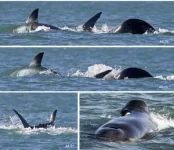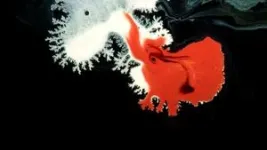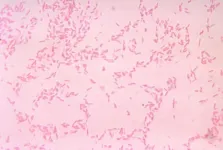(Press-News.org) An orca (killer whale) has been observed, for the first-ever time, individually consuming a great white shark – and within just two minutes.
“The astonishing predation, off the coast of Mossel Bay, South Africa, represents unprecedented behavior underscoring the exceptional proficiency of the killer whale”, remarks Dr. Alison Towner from Rhodes University, who led an international research team into the discovery.
Their findings are published today in the peer-reviewed African Journal of Marine Science.
The groundbreaking insight is the latest from Dr. Towner and the team, who, in 2022 in the same journal, revealed that a pair of orca were hunting and killing great white sharks off the coast of South Africa since 2017 – managing to drive large numbers of the sharks from their natural aggregation sites.
Orcas are generally known to work together to catch large prey like sea lions, seals, and even other whales – and of course, sharks too. By hunting together, they can surround prey and use their combined intelligence and strength to attack.
They can hunt large animals individually. However, this is the first such occurrence on what is one of the world's largest predators – the great white.
“Again, as previously in South Africa, the orcas are exhibiting a strong preference for extracting and consuming the lipid-rich livers of white sharks – a specialized feeding behavior,” explains Dr. Towner, who has studied great white sharks for the last 17 years, learning about their movement patterns through tagging data.
“But what we witnessed was an orca, nicknamed Starboard – due to his collapsed dorsal fin – performing alone to incapacitate and consume a white shark within an astounding two-minute timeframe.
“Starboard was observed preying on a 2.5-meter (8.2 feet) juvenile white shark, later carrying the shark’s liver in its mouth past a boat.
"This sighting revealed evidence of solitary hunting by at least one killer whale, challenging conventional cooperative hunting behaviors known in the region.
“These are groundbreaking insights into the predatory behavior of this species, and our findings significantly contribute to the global understanding of Killer Whale predation dynamics, enhancing knowledge of marine ecosystems and predator-prey relationships”.
During the observed interactions of this event, at least two white sharks were killed, as evidenced by the discovery of a second carcass measuring 3.55 meters (11.6 feet) nearby.
“The study raises critical questions about the impact of killer whale predation on shark populations in South Africa,” Dr. Towner says. “The displacement of various shark species due to killer whale presence may have implications for mesopredator release and potential trophic changes in the marine ecosystem.”
Understanding the ecological dynamics of killer whale predation is paramount for marine conservation efforts. The authors state that this event “underscores the urgent need for adaptable conservation strategies and vigilant ecological monitoring amidst changing environmental conditions”.
Founding Director and Principal Scientist at Sea Search Research & Conservation, and at the Department of BotZoo, University of Stellenbosch, Dr. Simon Elwen, is an expert in the ecology, behavior, and conservation status of whales.
Commenting on the importance of Dr. Towner’s team’s findings, he says: “The observations reported here add more layers to the fascinating story of these two killer whales and their capabilities. As smart, top predators, killer whales can rapidly learn new hunting techniques on their own or from others, so monitoring and understanding the behaviors used here and by other killer whales in South Africa is an important part of helping us understand more about these animals.”
The involvement of land-based observers, tourists on vessels, and collaborating institutions played a “pivotal role” in capturing this crucial data and footage of the predation events.
This particular event “underscores the benefits of citizen science as a collaborative effort between researchers, tourists, and organizations”, the authors state.
Esther Jacobs, from the marine conservation initiative, Keep Fin Alive, recounts her experience witnessing the predation: “Upon reaching Mossel Bay’s Seal Island, the scent of shark liver oil and a noticeable slick indicated a recent kill. Tracking Port and Starboard near the island, they remained separated.
“Witnessing a white shark's fin break the surface initially sparked excitement, but that turned to a somber realization as Starboard swiftly approached. The moment Starboard rapidly preyed on my favorite shark species was both devastating and intensely powerful.”
Co-author Dr. Primo Micarelli, from the Shark Studies Centre and Siena University, was on board the vessel White Shark Africa and commented: “Over two decades of annual visits to South Africa, I've observed the profound impact these killer whales have on the local white shark population. Seeing Starboard carry a white shark's liver past our vessel is unforgettable.
“Despite my awe for these predators, I'm increasingly concerned about the coastal marine ecology balance”.
Concluding, Dr. Towner highlights that the new findings on killer whales provide important further insights into how adaptable mammalian predators specialize and diverge ecologically.
“The presence of these shark-hunting killer whales possibly ties into broader ecosystem dynamics. Rapid developments in this phenomenon, make it challenging for science to keep pace, prompting us to publish these timely short communications."
END
Orcas demonstrating they no longer need to hunt in packs to take down the great white shark
Study reveals “astonishing” footage of new predation tactics of the orca, raising further concerns about the marine ecosystem
2024-03-01
ELSE PRESS RELEASES FROM THIS DATE:
Scientists discover a novel vehicle for antibiotic resistance
2024-03-01
By David L. Chandler
WOODS HOLE, Mass. -- Antibiotic resistance is a significant and growing medical problem worldwide. Researchers at the Marine Biological Laboratory (MBL) and collaborators have found a novel genetic arrangement that may help a common bacterium in the human gut, Bacteroides fragilis, protect itself from tetracycline, a widely used antibiotic.
While these findings will not lead directly to new ways of combating tetracycline-resistant bacteria, the researchers have discovered previously unseen genetic arrangements that confer antibiotic resistance. Such understanding might help in developing new ways to limit the spread of antibiotic resistance genes, through genetic ...
Large-scale study explores link between smoking and DNA changes across six racial and ethnic groups
2024-03-01
Smoking changes the way genes are expressed, which later contributes to the development of lung cancer and other smoking-related illnesses. But the link between epigenetics (the study of mechanisms that impact gene expression) and smoking is not fully understood, especially in terms of differences across racial and ethnic groups.
“We know that smoking affects people differently based on their race and ethnicity, but identifying epigenetic signatures of smoking would help us better predict risk for smoking-related diseases,” said Brian Huang, PhD, an assistant professor in the department of population ...
EU funding for outstanding early-career researcher Pieter Gunnink
2024-03-01
Dr. Pieter Gunnink from the Institute of Physics at Johannes Gutenberg University Mainz (JGU) has been awarded a EUR 190,000 Marie Skłodowska-Curie Postdoctoral Fellowship by the European Commission. The grant is an individual award for Gunnink's outstanding achievements in the field of spintronics and provides financial support for his research over a period of 24 months.
Modern information processing relies heavily on the use of electrical current, the transport of which requires large amounts of energy. The field of ...
Associate Professor Ron Korstanje, Ph.D., of The Jackson Laboratory named Evnin Family Chair
2024-03-01
Associate Professor Ron Korstanje, Ph.D., has been named the Evnin Family Chair at The Jackson Laboratory. An expert in the genetics of kidney function and disease, Korstanje’s appointment marks a new chapter in his 20 years of service to JAX’s mission.
“Ron’s exceptional contributions to JAX have advanced research discoveries and nurtured generations of future scientists,” said President and CEO Lon Cardon, Ph.D., FMedSci. “His appointment as the Evnin Family ...
Researchers create coating solution for safer food storage
2024-03-01
In a collaborative effort to improve the food industry, Dr. Mustafa Akbulut, professor of chemical engineering, and Dr. Luis Cisneros-Zevallos, professor of horticultural science, have developed a two-step coating solution for galvanized steel that is more hygienic and reduces the risk of corrosion.
Galvanized steel containers and surfaces are used for harvested produce because of their durability, strength and lower cost compared to stainless steel. However, bacteria residing in storage containers can cause corrosion.
The ...
An overgrowth of nerve cells appears to cause lingering symptoms after recurrent UTIs
2024-03-01
DURHAM, N.C. – A perplexing problem for people with recurring urinary tract infections (UTIs) is persistent pain, even after antibiotics have successfully cleared the bacteria.
Now Duke Health researchers have identified the likely cause - an overgrowth of nerve cells in the bladder.
The finding, appearing March 1 in the journal Science Immunology, provides a potential new approach to managing symptoms of recurring UTIs that would more effectively target the problem and reduce unnecessary antibiotic usage.
“Urinary tract infections account for almost 25% of infections in women,” said senior author Soman Abraham, Ph.D., professor in the departments ...
New findings on the immune system
2024-03-01
T follicular helper cells (Tfh) are essential for strong antibody-mediated reactions of our immune system during infections and vaccinations. However, if they get out of control, this can cause diseases such as autoimmunity, allergies or cancer. Researchers from the University Hospital Bonn (UKB) and the Cluster of Excellence ImmunoSensation2 at the University of Bonn investigated the underlying mechanisms of Tfh cell development in a mouse model and thus decoded their internal networking. They hope that this will lead to new strategies for the development of highly effective vaccines and new therapies to combat various diseases. The results have ...
Most smokers in England wrongly believe vaping is at least as harmful as smoking
2024-03-01
More than half of smokers in England wrongly believe that vaping is more harmful or as harmful as smoking, according to a new study led by UCL (University College London) researchers.
The study, published in the journal JAMA Network Open and funded by Cancer Research UK, looked at survey responses from 28,393 smokers in England between 2014 and 2023.
The research team found that public perceptions of e-cigarettes had worsened considerably over the past decade, with an overall increase in the perceived harm of e-cigarettes since 2021, coinciding with a sharp rise in vaping among young ...
New antibodies target “dark side” of influenza virus protein
2024-03-01
WHAT:
Researchers at the National Institutes of Health have identified antibodies targeting a hard-to-spot region of the influenza virus, shedding light on the relatively unexplored “dark side” of the neuraminidase (NA) protein head. The antibodies target a region of the NA protein that is common among many influenza viruses, including H3N2 subtype viruses, and could be a new target for countermeasures. The research, led by scientists at the National Institute of Allergy and Infectious Diseases’ Vaccine Research Center, part of NIH, was published today in Immunity.
Influenza, or flu, sickens millions ...
Fred Hutch announces 2024 Harold M. Weintraub Graduate Student Award recipients
2024-03-01
Fred Hutchinson Cancer Center announced 12 recipients of the 2024 Harold M. Weintraub Graduate Student Award, which recognizes exceptional achievement in graduate studies in the biological sciences.
This year’s recipients come from U.S. and international research institutions with thesis topics that include brain signals related to learning and emotion, bacterial pathogens and health, AI algorithms in rare disease diagnosis and treatment, and immune cells involved in brain tumors.
“Weintraub awardees showcase how scientists are using advancements in technology to explore questions that have been out of reach,” said Jihong Bai, ...
LAST 30 PRESS RELEASES:
Fossil amber reveals the secret lives of Cretaceous ants
Predicting extreme rainfall through novel spatial modeling
The Lancet: First-ever in-utero stem cell therapy for fetal spina bifida repair is safe, study finds
Nanoplastics can interact with Salmonella to affect food safety, study shows
Eric Moore, M.D., elected to Mayo Clinic Board of Trustees
NYU named “research powerhouse” in new analysis
New polymer materials may offer breakthrough solution for hard-to-remove PFAS in water
Biochar can either curb or boost greenhouse gas emissions depending on soil conditions, new study finds
Nanobiochar emerges as a next generation solution for cleaner water, healthier soils, and resilient ecosystems
Study finds more parents saying ‘No’ to vitamin K, putting babies’ brains at risk
Scientists develop new gut health measure that tracks disease
Rice gene discovery could cut fertiliser use while protecting yields
Jumping ‘DNA parasites’ linked to early stages of tumour formation
Ultra-sensitive CAR T cells provide potential strategy to treat solid tumors
Early Neanderthal-Human interbreeding was strongly sex biased
North American bird declines are widespread and accelerating in agricultural hotspots
Researchers recommend strategies for improved genetic privacy legislation
How birds achieve sweet success
More sensitive cell therapy may be a HIT against solid cancers
Scientists map how aging reshapes cells across the entire mammalian body
Hotspots of accelerated bird decline linked to agricultural activity
How ancient attraction shaped the human genome
NJIT faculty named Senior Members of the National Academy of Inventors
App aids substance use recovery in vulnerable populations
College students nationwide received lifesaving education on sudden cardiac death
Oak Ridge National Laboratory launches the Next-Generation Data Centers Institute
Improved short-term sea level change predictions with better AI training
UAlbany researchers develop new laser technique to test mRNA-based therapeutics
New water-treatment system removes nitrogen, phosphorus from farm tile drainage
Major Canadian study finds strong link between cannabis, anxiety and depression
[Press-News.org] Orcas demonstrating they no longer need to hunt in packs to take down the great white sharkStudy reveals “astonishing” footage of new predation tactics of the orca, raising further concerns about the marine ecosystem







